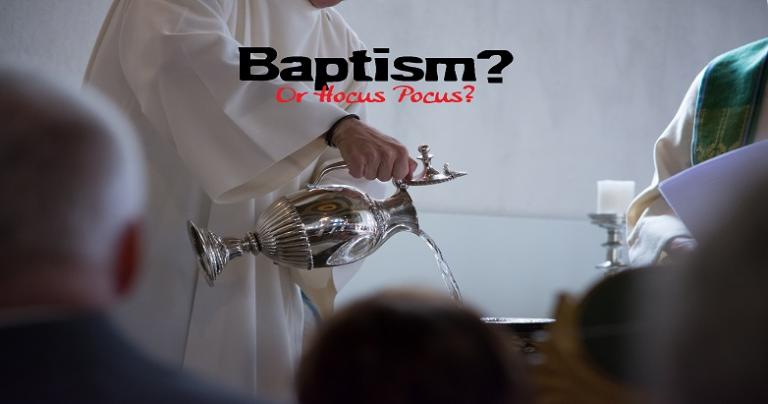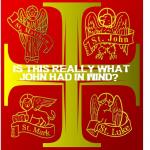
Baptism and Eucharist should be more than using correct verbal formulas.
COVID-19 continues to ravage 2020. In the United States, a would-be dictator works to render meaningless every Fourth of July and Memorial Day celebration. A related eviction situation begins to explode, widening an economic disaster that dwarfs the Great Depression. Millions more may be starving soon in our cruel and greedy world where so many already die of hunger despite abundance. Vile racism is ingrained in our U.S. social institutions and too many Americans roll their eyes at protests. The genuine threat of civil war grows. Our global environment deteriorates as signs of an extinction-level event increase.
Where are the Catholics? Now more than ever, we need the power of the Gospel! So, where exactly is the Body of Christ?
ANSWER: upset over ritual formulas and pronouns. “Say the right words!!”
In the Archdiocese of Detroit, one Matthew Hood—God forbid I call him “father”!—recently realized something nightmarish. Hood thought he was an ordained priest and had been since 2017. Hood believed that he had presided at hundreds of Masses since that time. But alas, he was wrong. Why? It’s because Hood wasn’t even Baptized—you see, the wrong words were used.
Baptism and Magic
So Hood read that Vatican note saying if the words are wrong, then the baptism isn’t valid. Don’t you dare change “I baptize you…” to “We baptize you…”! Because then, abracadabra!—there ain’t no baptism!
After reading that note, Hood recalled a family video of his own baptism as a baby. Then this Millennial’s blood ran cold.
You see, to Hood’s horror, the person who baptized him did not say, “I baptize you…” Instead, he said, “We baptize you…” Everything else was fine and Trinitarian! The only thing that was “off” was the pronoun, “we.” So was Hood a priest? Nope. Is he a deacon? Not at all. The reason? It’s because Hood isn’t even baptized. So sayeth the Congregation for the Doctrine of the Faith. God bless their priorities!
(To be fair, perhaps there were communications failures here. Did the CDF intend to safeguard the proper intention of baptism? Did they misunderstand “We baptize…” as meaning “We, the community, are the author and source of the grace of Baptism”? Was this a bad translation or misinterpretation? Love is patient, my friends. The brilliant Henry Karlson wisely reminded me of these things)
What Happens to the People??
In any case, is every Eucharist at which Hood presided stripped of grace? The Detroit Catholic reported that on Aug. 9, 2020, Hood was validly baptized, confirmed and received the Eucharist. He was subsequently ordained a transitional deacon and a priest two days later on Aug. 17. WHEW! SAFE!
But what about the people he served? Are we to believe that nothing happened but unanswered prayers? That seems to fly in the face of the historical Church teaching.
https://youtu.be/-mUXyNURmOQ
But some would affirm the worst. Mass never happened! They would claim that if Hood performed any Confirmation celebrations, well, those didn’t happen either. And forget about any absolutions!—the only thing guaranteed in these Confessional transactions were the stipends Hood received (yes, priests get those).
Neither were Eucharists or Confirmations real. God is a stickler for details, you see. Apparently, OCD is a divine attribute.
Baptism: the Experience
So this got me thinking about how we are so rationalistic in the West! In contrast, the place from which our Church and its sacraments originate is very different. The Church was conceived in a cultural world open to the panhuman experience of altered states of consciousness. In that very different cultural world, people experience genuine symbols—something that makes two things one.
In that world, experiencing a symbol is very much like entering through a doorway into the Realm of God. People get transported deep into Mystery in a tangible experience of metamorphosis. This is a world of visions, sky journeys, and healings. People are commissioned and empowered by God.
Our liturgies evolved out of that world. But by the time it reached us, something essential was lost, not so much in it, but in us.
Let me ask you—when you go to Mass, and when, in the preface, we hear Christ renewing all things, what happens? When we lift our voices in the Sanctus, what happens to you? Do you share Isaiah’s vision (Isaiah 6:1-8)? Are you transported into the sky vaults (Revelation 4:1-2)? Are you healed? Transformed? You should be. The liturgy was designed for this.
Bigger Problem than Baptism
What happened? What went wrong?
Going by the research of Dr. Felicitas Goodman, we went wrong. Us Western, post-Industrial folk.
She explains that things are different in other societies. The altered state of consciousness (henceforth ASC) experience of the hunter-gatherer or agrarian peoples communicates empowerment from Alternate Reality. This means that they become better hunters, or better healers, or better orators, etc. For such a person, symbols are more than signifiers—they bring the person into oneness with That which is symboled. Ritual works in such societies. Heaven and earth touch and metamorphoses occur.
Moving into other societies, the ASC of the agricultural person also communicates favors from Alternate Reality (or Spirit world, or Realm of God). Goodman explains that he or she is favored and blessed. But there is no empowerment.
Baptism by Culture
Finally, we reach anomalous societies like ours. In our urban-dwelling, post-Industrial individualistic culture, the path to Alternate Reality is cut off. There is no empowerment, grace, or blessing given. All we have are religions decorated by signs of these. ASC experiences seldom ever happen in our religious gatherings. For the Western individualist, the ASC occurs almost always in dreams or under controlled substances, otherwise not at all.
In contrast to the post-industrial West, when the agrarian person experiences symbol, he or she does so as a doorway into the Realm of God. But for us? Religious items merely decorate our sacred places or homes. Thus, when we Westerners see “In God we trust,” or “the Cross,” or “the Crown of Thorns,” or “a Lenten desert scene,” we don’t go anywhere. There seems to be a longstanding malfunction in us Westerners that renders the symbol crippled as a vehicle to carry us into Mystery, or Alternate Reality. Hence, we are starved of God.
We are not starved from lack of God, mind you. We starve the way someone suffering near-total paralysis would at a banquet hall without any assistance. Someone completely unable to reach out to the abundance surrounding him.
Ultimate Loss of Meaning
Show signs like a crown of thorns or the crucifix to fellow Westerners and see what happens. We understand these signs as communications tools. Perhaps we get emotionally or intellectually charged, like watching a Mel Gibson film. But we don’t go anywhere.
Therefore our Western social world or “habitat” has produced an ultimate loss—God. We have lost Alternate Reality.
As Goodman says, you can spin it any way you like, but God cannot be found in cultural Consensus Reality. Why? Our culturally-specific ideas of God are not God. God is more. The Real is more. Our intellectual concept of the “state of grace” is not grace.
Baptism & Real Sacramentality
But isn’t God everywhere, in all things? Yes. But how well do you see?
Consensus reality (culturally pragmatic or “ordinary” reality) is but a tiny island floating in the Limitless Ocean that is Alternate Reality. We can prattle about correct formulas to say or how we are to perform this or that rite. But if it’s just kept at the intellectual or emotional level, there’s no transformation. I’m not talking about ex opere operato, but ex opere operantis.
Baptism of Ideas
So returning to the Strange Case of the Unbaptized Priest, imagine that since 2017, Father Hood presided at hundreds of masses. Think about all those people gathering for Mass. The synaxis came together—ah, but not really. None of those were really Eucharist. God let everyone be deceived. Because of a cruel cosmic joke, the spiritual mechanics were not there, not correctly in place.
And all those absolutions (read: healings)! Worthless. All those well-meaning people, in faith, gathering together! Too bad, because God refuses to come. God refuses to functionally operate in reconciliation. And God refuses to be present truly, really, and substantially at the Lord’s Supper. Unless all the words are right, God’s a no-show. Too bad for all those people, huh?
12th-century scholastics first argued that the words of institution are essential to the Eucharist. Yes, earlier Ambrose did speak about the efficacy of the words of consecration. But he neither restricted anything nor called this a “formula.” Neither did Peter Lombard limit matters when teaching about baptism.
How many people in the first century, like Paul, were actually baptized in the “valid” Trinitarian formula? Many? That’s doubtful. Where is the proof for that? Does that mean that when such people broke bread, that wasn’t really Eucharist?
Waiting for the Magisterium
By all means, let’s wait for further clarification from the CDF. Meanwhile, people languish without meaning in the dark Winter of COVID-19. Too bad that our Church remains unmoved and ultimately irrelevant where it counts.
What was it that Happy Pilgrim said? God became flesh, says “John.” But since that time, we’ve tried to turn the flesh into words. Words, words, words!
















